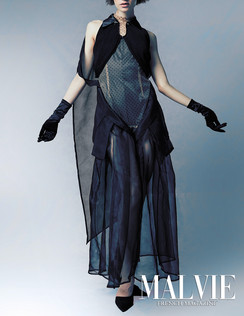
In the world of fashion, where creativity is the ultimate currency, few designers manage to carve a niche as distinct and thought-provoking as Junyi Dong. With a portfolio that seamlessly blends artistic expression with technical prowess, Junyi Dong has firmly established herself as a force to be reckoned with in the avant-garde fashion industry. Her latest project, titled "Hitchcock," serves as a testament to her ability to merge cinematic inspiration with cutting-edge design, all while making a powerful feminist statement.
The Power of Monochrome: Shades of Black, Grey, and White
The visual language of "Hitchcock" is defined by a palette of black, grey, and white—an homage to the monochrome aesthetics of Hitchcock's films. These colors, often associated with simplicity and restraint, are employed by Junyi Dong to delve deeper into the concept of the male gaze. By manipulating these shades, the designer creates a dialogue between light and shadow, much like Hitchcock did with his cinematography.
"His methodology—using shadows, suspenseful music, and meticulous framing—creates a sense of horror that is as psychological as it is visual. I was fascinated by how Hitchcock could evoke such intense feelings of fear and discomfort without showing a drop of blood," Junyi explains. "It made me think about the power dynamics at play in his films, particularly how the camera—controlled by a male director—frames the female body in a way that strips it of agency.”

Each piece in the collection is meticulously crafted to explore the tension between visibility and invisibility, a recurring theme in Hitchcock's work. The use of black—often seen as a color of power and mystery—contrasts with the vulnerability symbolized by white. Grey, sitting between these extremes, represents the ambiguity of the female experience in a patriarchal society.
For Junyi, Hitchcock's work provided fertile ground for exploring the nuances of the male gaze, especially as it pertains to the portrayal of women on screen. "The actresses in Hitchcock's films are often portrayed as passive, as victims of the male gaze. They are seen but not heard, framed in a way that diminishes their autonomy," says Junyi. "Through my designs, I wanted to give these women a voice, to reframe them as powerful figures who defy the narrative imposed upon them.”
Tradition Meets Technology: Embroidery and Laser-Cutting
One of the most striking aspects of the "Hitchcock" collection is the fusion of traditional embroidery techniques with modern laser-cutting technology. This combination of old and new not only reflects Junyi's deep respect for craftsmanship but also her forward-thinking approach to design.

Drawing inspiration from the surrealist works of Salvador Dalí, Junyi integrates intricate, hand-embroidered details into garments that are then laser-cut to create patterns that echo the disorienting, dream-like quality of Dalí's art. The result is a collection that feels both timeless and avant-garde, bridging the gap between the past and the future.
"Embroidery has always been a way for women to express themselves, often in environments where their voices were not heard," Junyi notes. "By combining this traditional technique with laser-cutting, I'm reclaiming that space for women in a modern context, using technology to amplify our stories."
A Feminist Statement in Fashion
At its core, the "Hitchcock" project is a powerful feminist statement. It challenges the traditional narratives that have long dominated both fashion and film, reinterpreting them through a lens that emphasizes female empowerment and autonomy. Through her work, Junyi not only critiques the male gaze but also offers an alternative vision—one where women are not merely subjects to be observed but active participants in their own stories.
In a fashion landscape that often prioritizes aesthetics over substance, Junyi stands out as a designer unafraid to infuse her work with meaning. The "Hitchcock" collection is not just a series of garments; it is a commentary on the power dynamics at play in the portrayal of women, both on screen and in society.
As Junyi continues to push the boundaries of fashion, her work serves as a reminder that clothing is more than just fabric—it is a canvas for ideas, a medium through which stories are told, and a powerful tool for change. With "Hitchcock," Junyi has once again proven that she is not just a designer but a true artist, one whose work resonates with both aesthetic beauty and profound meaning.
Photographer: James Kwak
Fashion Designer: Junyi Dong @pix_pixiq
Model: Sofiia Franskevich








Comentarios